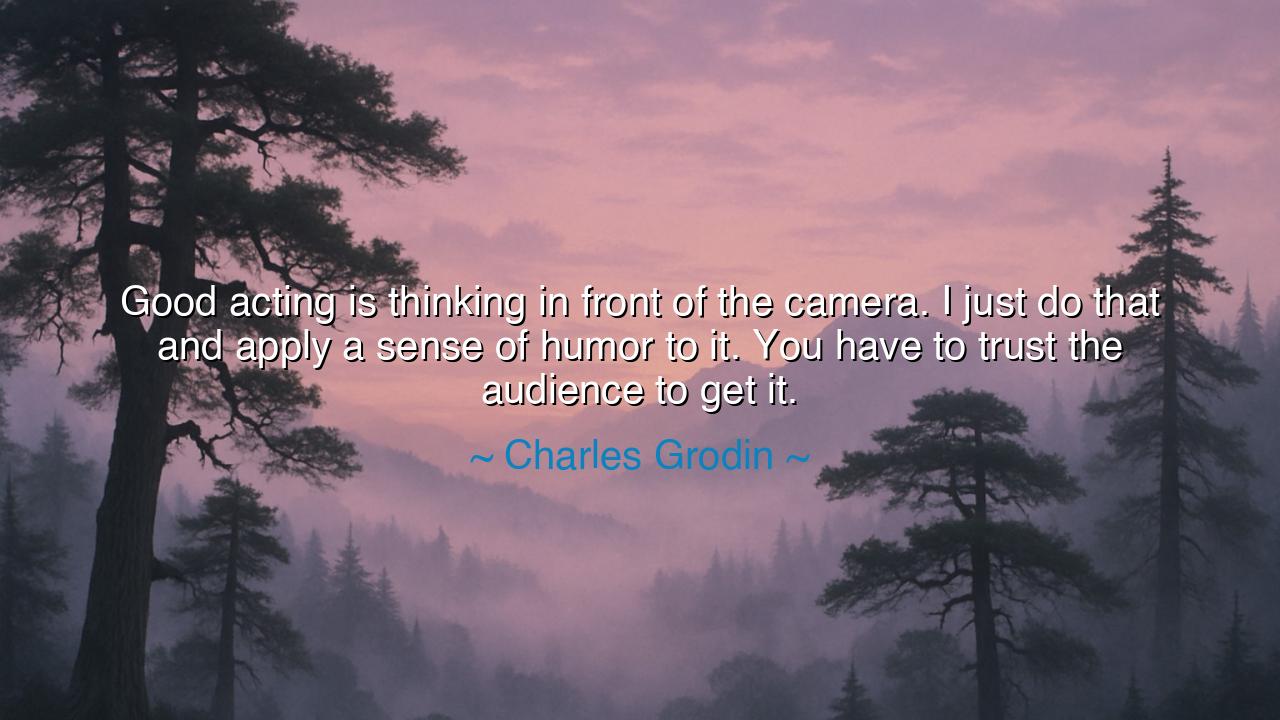
Good acting is thinking in front of the camera. I just do that
Good acting is thinking in front of the camera. I just do that and apply a sense of humor to it. You have to trust the audience to get it.






In the vast realm of acting, where skill and artistry come together to shape our understanding of life, there is a profound truth embedded in the words of Charles Grodin: "Good acting is thinking in front of the camera. I just do that and apply a sense of humor to it. You have to trust the audience to get it." These words transcend the mere mechanics of acting and touch upon a deeper principle—the power of presence and authenticity in connecting with others. Grodin’s philosophy speaks to the ancient idea that true mastery comes not from performing, but from being—thinking, feeling, and engaging in the moment in a way that allows the audience to see the truth of the character without needing to be told.
The ancients understood the power of authenticity in performance. The Greek philosopher Aristotle, in his treatise Poetics, described the essence of great tragedy and comedy as being grounded in the genuine emotions of the actors. To perform a role well, Aristotle argued, an actor must fully embody the character’s thoughts, emotions, and motivations, not through exaggerated gestures, but through natural and honest expression. Grodin’s words reflect this timeless principle: true acting is not about pretending or putting on a mask, but about revealing the inner workings of the mind, thinking through the character’s dilemmas in front of the camera and letting the audience draw its own conclusions. It is an act of trust, a belief that the audience will perceive and understand the depth of the performance.
Consider the example of the great Sophocles, whose plays were renowned not just for their compelling plots but for the emotional truth brought to life by the actors. The power of Greek drama lay in its ability to connect the audience with the character’s inner world—whether the tragic Oedipus confronting his fate or the flawed Antigone challenging the laws of the state. The actors, like Grodin, were not merely delivering lines—they were living and thinking through their characters’ dilemmas. Sophocles himself, deeply attuned to the human condition, understood that the best performances emerged not from grandiose gestures or forced emotion but from the quiet, authentic moments when the actor’s inner thoughts and feelings were laid bare before the audience.
In Grodin’s approach, the application of humor to acting becomes a powerful tool. The humor is not a forceful, out-of-place joke, but a natural outgrowth of the character’s inner life. It emerges from the complexity of the character’s thoughts and emotions, making the performance feel not only authentic but relatable. It is through humor that Grodin invites the audience into the character’s mind, allowing them to engage with the emotional tension while simultaneously offering a reprieve—a moment of lightness in the midst of deeper reflection. This balance between seriousness and humor allows the actor to present a complete human experience, one that mirrors the complexities of life itself.
The ancient Romans also knew the importance of this balance in performance, especially in the comedies of Plautus and Terence. Their characters were often placed in difficult or absurd situations, yet it was the subtlety of their humor—born from their inner conflict—that made them enduring. The humor of a Plautine character was never loud or forced; it came from the actor’s ability to express the character’s thoughts and emotions with authenticity, while still maintaining a sense of lightness that allowed the audience to engage without being overwhelmed by the tragedy of the situation. Grodin, much like the great Roman playwrights, understands that humor is not an escape from the serious moments of life but a way to embrace the fullness of the human experience—thought, emotion, and humor all coexisting in a delicate dance.
The lesson we take from Grodin’s reflection is one that applies not only to acting but to the way we navigate our own lives. Thinking in front of the camera—or in the real world—requires us to be present in every moment, fully aware of our own thoughts, motivations, and emotions, without forcing them into a predetermined mold. Authenticity is the key, and it is this honesty that allows others to connect with us, whether on screen or in our personal lives. Humor, too, plays an essential role in our ability to engage with the world. It is through the subtle use of humor that we invite others into our experience, offering a sense of relief, connection, and insight.
Thus, as we move through life, let us embrace Grodin’s approach to living authentically. In all our interactions, whether personal, professional, or creative, let us be mindful of the power of thought and humor. Let us trust those around us—our audience, whether large or small—to perceive the depth and complexity of our thoughts and emotions, and let us not shy away from humor as a means of expressing the full range of our experience. Like Grodin, let us seek to be present, to think deeply, and to engage with the world in a way that invites others into the complexity of our lives, finding meaning not in performance, but in true presence.






AAdministratorAdministrator
Welcome, honored guests. Please leave a comment, we will respond soon